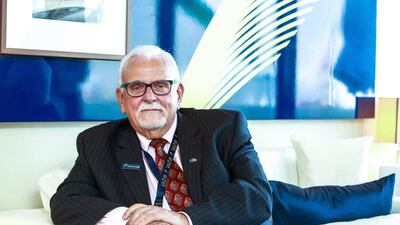Royal Jet is proceeding with its fleet renewal programme as planned, its chief executive said yesterday, as makers of business jets raise concerns about the regional outlook for the executive segment of the aviation sector.
Since last year, Royal Jet has been in the midst of a US$700 million renewal programme, so far utilising $200m to purchase five aircraft. The company has acquired two Global 5000s and a Learjet 60XR, and two Boeing Business Jets (BBJ) are on the way.
“Our goal is to have 20 airplanes by 2020,” said the chief executive Patrick Gordon.
The Abu Dhabi-based private charter operator uses 11 aircraft, six of which are BBJs, making it the world’s largest single operator of the aircraft.
Mr Gordon said the company was equipping all of its planes with an enhanced vision system (EVS), a navigational aid that allows the aircraft to operate in poor weather conditions such as fog.
The second BBJ will be delivered next month and will undergo the same process before joining the fleet.
Mr Gordon, who replaced Shane O’Hare as the chief executive in October last year, said the company’s medical evacuation service has posted 20 per cent growth in the past year.
Under Mr O’Hare there were plans to build fixed-base operations at the capital’s Al Bateen Airport, and it had also tied up with the high-end UK luxury travel company Abercrombie & Kent.
But since taking over, Mr Gordon has changed the company’s focus. Royal Jet, he said, would do what it does best – offer planes for charter. Mr Gordon said that the business aviation segment in the region remained strong and was growing much more quickly compared with other parts of the world.
He cited figures which said the sector in the Middle East would be worth $1.3 billion by 2020 from $515 million last year.
However, France’s Dassault Aviation and other business jet makers have voiced concerns about the impact of falling oil prices on the region’s economies.
Nevertheless, its chief executive said Dassault remained committed to its operations here.
“We are forecasting continued, although slower, regional growth in the short term, due to prevailing economic conditions, and will continue to invest in the region so we can continue to support our operators with maximum effectiveness,” Eric Trappier said.
Ben Moores, a senior analyst at IHS Aerospace, Defence and Security, said that while the Arabian Gulf had traditionally been a key driver for the large business jets market, it was likely that the narrative at the Dubai Airshow would “reinforce the downturn in this segment”.
But that has not stopped the makers of business jets from showcasing their latest wares in Dubai including the Dassault long-range Falcon 7X and the new mid-sized Legacy 500 from Brazil’s Embraer.
siyer@thenational.ae
Follow The National's Business section on Twitter
Video below: CNBC reports on the state of the private jet market from the Dubai Airshow and speaks to the chief executive of Embraer Executive Jets.

